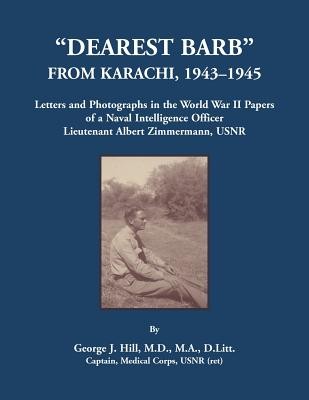| "Dearest Barb" From Karachi, 1943-1945 Contributor(s): Hill, George J. (Author) |
|
 |
ISBN: 0788458248 ISBN-13: 9780788458248 Publisher: Heritage Books OUR PRICE: $37.05 Product Type: Paperback Published: October 2018 |
| Additional Information |
| BISAC Categories: - Reference | Genealogy & Heraldry - History | Military - Korean War |
| Physical Information: 0.84" H x 8.5" W x 11" (2.09 lbs) 412 pages |
| Themes: - Chronological Period - 1950's - Cultural Region - East Asian |
| Descriptions, Reviews, Etc. |
| Publisher Description: Carefully boxed and bound with a silk ribbon, the letters of Lieutenant Albert Zimmermann to his wife Barbara from Karachi, India, in 1943-1945 were discovered nearly sixty years later, long after they were dead. These letters are unique. No other personal correspondence of a Naval Intelligence Officer in World War II is known to have survived. The 119 letters give a glimpse into the struggle of a husband and wife to cope with the anxiety of separation and uncertainty at the height of the war. They tell of her trials in raising their children alone, and of his attempts to advise her, while he is stationed on the other side of the world. Al Zimmermann was an honors graduate in mechanical engineering from the University of Pennsylvania, and he was a partner in a wool brokerage when Pearl Harbor was attacked. He had been recruited into undercover intelligence work before the war, and in 1942 he was commissioned as a Naval Intelligence Officer. He was sent to Karachi, India, in 1943, where he became Commanding Officer of the Naval Liaison Office. He was the senior U.S. Naval Officer in the part of India that in 1947 became the country of Pakistan. The letters tell of Zimmermann's long days of duty, and they tell obliquely of the many things that he must do, but cannot tell his wife about. They tell of his illnesses -- racking coughs, dysentery, sand fly fever, dengue -- and we learn that both Al and Barbara develop stomach ulcers. He is caught in a web of intrigue in India that is sometimes hard for him to understand. But he survived and made friends in high places. His month-long journey in 1943 along the North-West Frontier of India with another American intelligence officer -- Major Gordon Enders -- and a British baronet -- Major Sir Benjamin Bromhead -- was the first official step by America into the ancient contest known as the Great Game. He was probably the first U.S. Navy man to cross the Khyber Pass, and he was one of the first Americans to reach the remote principality of Chitral. Zimmermann knew how to use poor handwriting and coded references to pass the censor in order to tell his wife about the interesting people that he met, and of the many exotic places that he visited in Karachi and elsewhere in India and Ceylon. He took many photographs and movies, some of which he sent home from India, and others that he brought back with him in May 1945. In this book, there are 150 pictures of his historic trip along the Afghan border, and many of his other photos and stills from his movies. Some of his official records were found in the National Archives, and a nine-page document that had remained classified until 2010 is in the Appendix. A full-name, place, and subject index adds to the value of this work. |